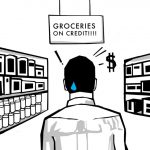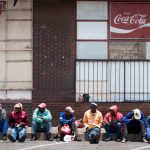It’s January and the debt burden is biting
South Africans suffer from high levels of household debt and lack of savings, both inhibiting economic growth. Only radical change will ease the load.
Author:
15 January 2019

Most ordinary people’s finances are starting to creak right about now. School fees, health insurance hikes and too many weeks to the end of the month are finishing off what’s left from December and many families will have little option but to take on debt. For the rest of the year, that debt will weigh on every pay cheque, if there are pay cheques, or mean another year of fighting off debt collectors and incurring fees on every bounced debit order.
If that sums up your situation, you’re far from alone. South Africans are groaning under the weight of household debt. On average, it adds up to around 65% of our disposable income. But, like every average in our grossly unequal society, that number is skewed. Wealthy families, whose only debt might be a fancy car, drag down the average. Many ordinary families’ debt will be equal to their disposable income, or higher. With interest rates on store cards and installment plans at 20% or more, that can mean a fifth of income draining away to service debt. Add rent and transport and healthcare and other basic expenses, and there’s not much left — unless you take on more debt.
Related article:
The consequences of our debt load are immense. South African households save around 1% of everything our economy produces. Even in the United States, a land of low-saving consumers, that rate is 5%, as it is in Chile and many other countries. In India and China, the rate is 15% or higher. Those savings fund the investment that generates those countries’ rapid growth. No country has ever closed that big a savings gap by relying on foreign investors. No country has ever grown at the rate we need South Africa to grow without a household savings rate of at least at 5% or more of its output.
Everything else — ratings agencies, government debt, state-owned enterprises — is just a sideshow to this basic constraint on our economy. We will not grow if our household savings rate does not rise. That will not happen while ordinary people stagger under these levels of debt. Debt forgiveness or write-offs on their own are not the answer. If the forces that produce our household debt aren’t remedied, we’ll be back in the same spot five years after any write-off.
So, what do we do? As this is the dominant fact in our economy, fixing it will not be easy. Only superficial problems have superficial remedies, so we will have to attack the problem on multiple fronts.
First, we must make it less profitable to lend to consumers. Much less profitable. Right now, it’s the most lucrative activity banks can undertake and it’s how some retail companies earn any profits at all. That’s why they move heaven and earth to convince people to borrow, and why we should lower the cap on the interest they can charge.
A second step is to ban debit orders. They are a barbaric relic of apartheid and would have been banned in Europe or the US or Asia a long time ago. Elsewhere, it is scarcely conceivable that someone can sign away almost unlimited authority to their bank account. There is no reason that stop orders or monthly debit card payments will not suffice. That will reduce the power creditors have over households, which is the point, but still allow hassle-free repayment.
Banks and stores and other predatory lenders will complain that these steps will reduce the number of loans they make and hence reduce growth. That’s pretty much the argument heroin makes in the head of an addict trying to kick the habit. Growth wholly dependent on household debt is a drug and will destroy our country in the long run. We must reduce that dependence and we cannot do so without making it less profitable to push credit.
Related article:
Of course, we also need to act on demand. We need tighter regulations on advertising that we know preys on our worst impulses. We banned tobacco advertising, and excessive debt arguably causes more harm to our homes and our country than smoking. We also need to change our individual behaviour, whether it’s middle-class families buying BMWs or low-income households buying giant TVs.
Most of all, we need serious institutional change. We need a Reserve Bank that does not see any attempt to argue with it as an attempt to pitch us into Zimbabwe or Venezuela. The Reserve Bank sets interest rates and regulates lending. The Reserve Bank sets rates too high, for no rhyme or reason, and refuses to act against consumer lending, preferring to hand massive profits to the banks. Nationalising the bank will achieve nothing. Exactly zero. But the president will have to appoint almost half its governing council this year and has the chance to replace its dinosaur of a governor. If he does so, it will mean more for the economy than any farcical debate that will undoubtedly surround our farce of an election.
We also need a National Treasury that is not a graveyard of dead ideas. We need new sources of growth to help us kick the debt habit — and that will not happen as long as Treasury, President Cyril Ramaphosa’s Cabinet and the opposition continue to flounder in search of a single genuine idea. Hunting for the magic fairies known as “foreign investors” or the mythical being called the “developmental state” does not count as an idea.
In the end, the only way we will get our debt under control is if our incomes rise, the pushers of debt leave us alone and we change how we consume. Higher incomes channelled into higher savings being invested to generate yet higher incomes is the only way out of our malaise. It’s easy to forget this basic structural fact. But whatever the nonsense spouted for the next year by so-called experts, all those debit orders eating up all the money every month will not let us forget it.


